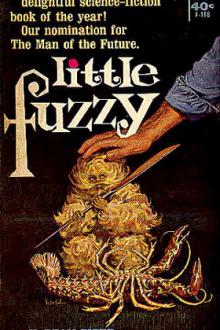Little Fuzzy, H. Beam Piper [books successful people read .txt] 📗

- Author: H. Beam Piper
- Performer: 0809562820
Book online «Little Fuzzy, H. Beam Piper [books successful people read .txt] 📗». Author H. Beam Piper
“You know, yourself, that the Fuzzies didn’t hurt that girl,” Brannhard told him.
“I don’t know anything of the kind,” the police chief retorted. “All I know’s what was reported to me.”
That had started out a bright red; gradually it faded into purple. Evidently Piet Dumont was adopting a rules-of-evidence definition of truth.
“Who told you about it?”
“Luther Woller. Detective lieutenant on duty at the time.”
The veridicator agreed that that was the truth and not much of anything but the truth.
“But you know that what really happened was that Lurkin beat the girl himself, and Woller persuaded them both to say the Fuzzies did it,” Max Fane said.
“I don’t know anything of the kind!” Dumont almost yelled. The screen blazed red. “All I know’s what they told me; nobody said anything else.” Red and blue, juggling in a typical quibbling pattern. “As far as I know, it was the Fuzzies done it.”
“Now, Piet,” Fane told him patiently. “You’ve used this same veridicator here often enough to know you can’t get away with lying on it. Woller’s making you the patsy for this, and you know that, too. Isn’t it true, now, that to the best of your knowledge and belief those Fuzzies never touched that girl, and it wasn’t till Woller talked to Lurkin and his daughter at headquarters that anybody even mentioned Fuzzies?”
The screen darkened to midnight blue, and then, slowly, it lightened.
“Yeah, that’s true,” Dumont admitted. He avoided their eyes, and his voice was surly. “I thought that was how it was, and I asked Woller. He just laughed at me and told me to forget it.” The screen seethed momentarily with anger. “That son of a Khooghra thinks he’s chief, not me. One word from me and he does just what he damn pleases!”
“Now you’re being smart, Piet,” Fane said. “Let’s start all over….”
A constabulary corporal was at the controls of the car Jack had rented from the hotel: Gerd had taken his place in one of the two constabulary cars. The third car shuttled between them, and all three talked back and forth by radio.
“Mr. Holloway.” It was the trooper in the car Gerd had been piloting. “Your partner’s down on the ground; he just called me with his portable. He’s found a cracked prawn-shell.”
“Keep talking; give me direction,” the corporal at the controls said, lifting up.
In a moment, they sighted the other car, hovering over a narrow ravine on the left bank of the stream. The third car was coming in from the north. Gerd was still squatting on the ground when they let down beside him. He looked up as they jumped out.
“This is it, Jack” he said. “Regular Fuzzy job.”
So it was. Whatever they had used, it hadn’t been anything sharp; the head was smashed instead of being cleanly severed. The shell, however, had been broken from underneath in the standard manner, and all four mandibles had been broken off for picks. They must have all eaten at the prawn, share alike. It had been done quite recently.
They sent the car up, and while all three of them circled about, they went up the ravine on foot, calling: “Little Fuzzy! Little Fuzzy!” They found a footprint, and then another, where seepage water had moistened the ground. Gerd was talking excitedly into the portable radio he carried slung on his chest.
“One of you, go ahead a quarter of a mile, and then circle back. They’re in here somewhere.”
“I see them! I see them!” a voice whooped out of the radio. “They’re going up the slope on your right, among the rocks!”
“Keep them in sight; somebody come and pick us up, and we’ll get above them and head them off.”
The rental car dropped quickly, the corporal getting the door open. He didn’t bother going off contragravity; as soon as they were in and had pulled the door shut behind them, he was lifting again. For a moment, the hill swung giddily as the car turned, and then Jack saw them, climbing the steep slope among the rocks. Only four of them, and one was helping another. He wondered which ones they were, what had happened to the other two and if the one that needed help had been badly hurt.
The car landed on the top, among the rocks, settling at an awkward angle. He, Gerd and the pilot piled out and started climbing and sliding down the declivity. Then he found himself within reach of a Fuzzy and grabbed. Two more dashed past him, up the steep hill. The one he snatched at had something in his hand, and aimed a vicious blow at his face with it; he had barely time to block it with his forearm. Then he was clutching the Fuzzy and disarming him; the weapon was a quarter-pound ballpeen hammer. He put it in his hip pocket and then picked up the struggling Fuzzy with both hands.
“You hit Pappy Jack!” he said reproachfully. “Don’t you know Pappy any more? Poor scared little thing!”
The Fuzzy in his arms yeeked angrily. Then he looked, and it was no Fuzzy he had ever seen before—not Little Fuzzy, nor funny, pompous Ko-Ko, nor mischievous Mike. It was a stranger Fuzzy.
“Well, no wonder; of course you didn’t know Pappy Jack. You aren’t one of Pappy Jack’s Fuzzies at all!”
At the top, the constabulary corporal was sitting on a rock, clutching two Fuzzies, one under each arm. They stopped struggling and yeeked piteously when they saw their companion also a captive.
“Your partner’s down below, chasing the other one,” the corporal said. “You better take these too; you know them and I don’t.”
“Hang onto them; they don’t know me any better than they do you.”
With one hand, he got a bit of Extee Three out of his coat and offered it; the Fuzzy gave a cry of surprised pleasure, snatched it and gobbled it. He must have eaten it before. When he gave some to the corporal, the other two, a male and a female, also seemed familiar with it. From below, Gerd was calling:
“I got one, It’s a girl Fuzzy; I don’t know if it’s Mitzi or Cinderella. And, my God, wait till you see what she was carrying.”
Gerd came into sight, the fourth Fuzzy struggling under one arm and a little kitten, black with a white face, peeping over the crook of his other elbow. He was too stunned with disappointment to look at it with more than vague curiosity.
“They aren’t our Fuzzies, Gerd. I never saw any of them before.”
“Jack, are you sure?”
“Of course I’m sure!” He was indignant. “Don’t you think I know my own Fuzzies? Don’t you think they’d know me?”
“Where’d the pussy come from?” the corporal wanted to know.
“God knows. They must have picked it up somewhere. She was carrying it in her arms, like a baby.”
“They’re somebody’s Fuzzies. They’ve been fed Extee Three. We’ll take them to the hotel. Whoever it is, I’ll bet he misses them as much as I do mine.”
His own Fuzzies, whom he would never see again. The full realization didn’t hit him until he and Gerd were in the car again. There had been no trace of his Fuzzies from the time they had broken out of their cages at Science Center. This quartet had appeared the night the city police had manufactured the story of the attack on the Lurkin girl, and from the moment they had been seen by the youth who couldn’t bring himself to fire on them, they had left a trail that he had been able to pick up at once and follow. Why hadn’t his own Fuzzies attracted as much notice in the three weeks since they had vanished?
Because his own Fuzzies didn’t exist any more. They had never gotten out of Science Center alive. Somebody Max Fane hadn’t been able to question under veridication had murdered them. There was no use, any more, trying to convince himself differently.
“We’ll stop at their camp and pick up the blanket and the cushions and the rest of the things. I’ll send the people who lost them checks,” he said. “The Fuzzies ought to have those things.”
XIIIThe management of the Hotel Mallory appeared to have undergone a change of heart, or of policy, toward Fuzzies. It might have been Gus Brannhard’s threats of action for racial discrimination and the possibility that the Fuzzies might turn out to be a race instead of an animal species after all. The manager might have been shamed by the way the Lurkin story had crumbled into discredit, and influenced by the revived public sympathy for the Fuzzies. Or maybe he just decided that the chartered Zarathustra Company wasn’t as omnipotent as he’d believed. At any rate, a large room, usually used for banquets, was made available for the Fuzzies George Lunt and Ben Rainsford were bringing in for the trial, and the four strangers and their black-and-white kitten were installed there. There were a lot of toys of different sorts, courtesy of the management, and a big view screen. The four strange Fuzzies dashed for this immediately and turned it on, yeeking in delight as they watched landing craft coming down and lifting out at the municipal spaceport. They found it very interesting. It only bored the kitten.
With some misgivings, Jack brought Baby down and introduced him. They were delighted with Baby, and Baby thought the kitten was the most wonderful thing he had ever seen. When it was time to feed them, Jack had his own dinner brought in, and ate with them. Gus and Gerd came down and joined him later.
“We got the Lurkin kid and her father,” Gus said, and then falsettoed: “‘Naw, Pop gimme a beatin’, and the cops told me to say it was the Fuzzies.’”
“She say that?”
“Under veridication, with the screen blue as a sapphire, in front of half a dozen witnesses and with audiovisuals on. Interworld’s putting it on the air this evening. Her father admitted it, too; named Woller and the desk sergeant. We’re still looking for them; till we get them, we aren’t any closer to Emmert or Grego. We did pick up the two car cops, but they don’t know anything on anybody but Woller.”
That was good enough, as far as it went, Brannhard thought, but it didn’t go far enough. There were those four strange Fuzzies showing up out of nowhere, right in the middle of Nick Emmert’s drive-hunt. They’d been kept somewhere by somebody—that was how they’d learned to eat Extee Three and found out about viewscreens. Their appearance was too well synchronized to be accidental. The whole thing smelled to him of a booby trap.
One good thing had happened. Judge Pendarvis had decided that it would be next to impossible, in view of the widespread public interest in the case and the influence of the Zarathustra Company, to get an impartial jury, and had proposed a judicial trial by a panel of three judges, himself one of them. Even Leslie Coombes had felt forced to agree to that.
He told Jack about the decision. Jack listened with apparent attentiveness, and then said:
“You know, Gus, I’ll always be glad I let Little Fuzzy smoke my pipe when he wanted to, that night out at camp.”
The way he was feeling, he wouldn’t have cared less if the case was going to be tried by





Comments (0)